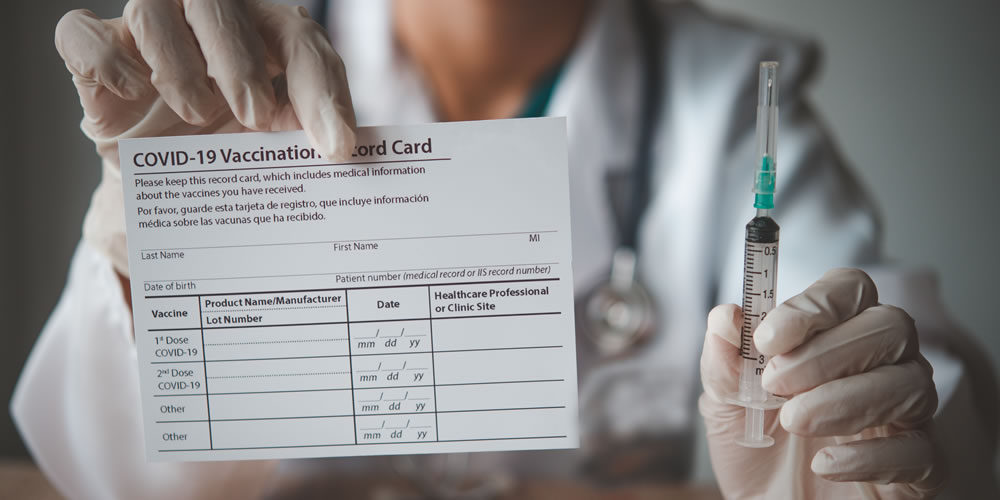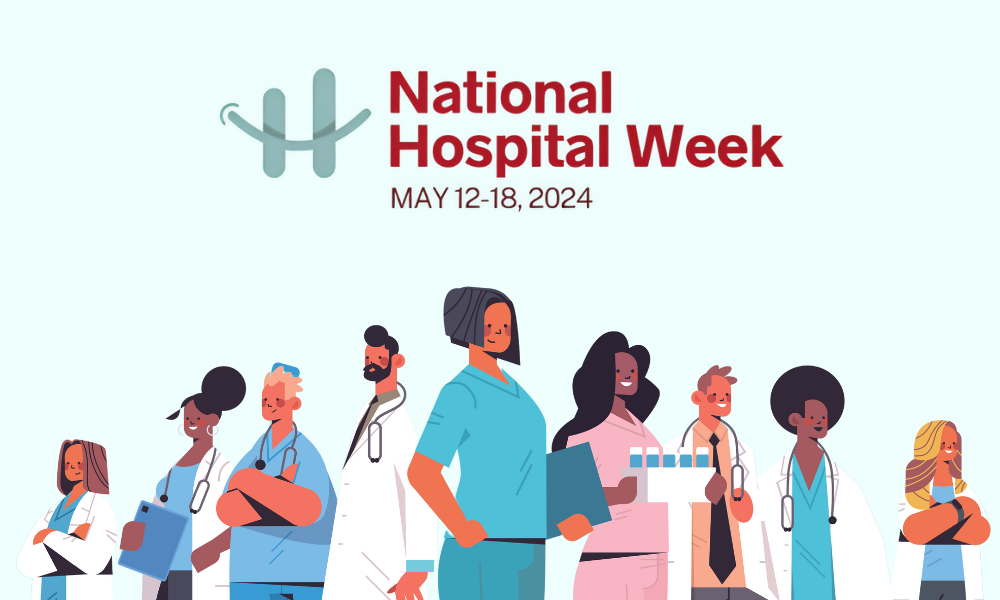Hospitals Faced Staff Shortages as Vaccination Deadlines Passed
(Edited from Becker’s Hospital News story by Kelly Gooch, 9/29/2021, and AP story by Heather Hollingsworth and Tammy Webber, 9/27/2021)
As many hospitals in the US grapple with staffing shortages exacerbated by the COVID-19 pandemic, they now face staff attrition resulting from vaccination mandates.
Almost two dozen states have mandated vaccination covering healthcare workers in hospitals, long-term care facilities, or both. Some allow exemptions on medical or religious grounds (New York State eliminated this exemption a month ago), but often those employers require regular COVID-19 testing.
With deadlines looming this week in states like New York, California, Connecticut, and Rhode Island, administrators feared some employees would quit, or let themselves be fired or suspended, rather than get vaccinated. (However, half a dozen states have banned vaccination mandates.)
The federal government also is mandating vaccination for more than 17 million healthcare workers at Medicare- and Medicaid-participating hospitals and other healthcare settings. CMS said it is developing a mandate-related interim final rule with a comment period to be issued in October.
This all comes as healthcare staff shortages are projected to reach 3.2 million by 2026.
“How this is going to play out, we don’t know. We are concerned it will exacerbate an already-quite-serious staffing problem,” California Hospital Association (CHA) spokesperson Jan Emerson-Shea said.
In fact, according to Fierce Healthcare, ” ‘As a practical matter, this policy may result in exacerbating the severe workforce shortage problems that currently exist,’ American Hospital Association President and CEO Rick Pollack said in a Sept. 9 statement.
“On Sept. 22, Arkansas Community Hospital Executive Director James Magee said his 25-bed rural facility would not require COVID-19 vaccinations. He stressed that staffing issues and the fear of losing too many nurses were major factors in the decision.
“ ‘Mandating [vaccination] really works a “hard stop” on the smaller hospitals because we don’t have an extra pool of nurses to draw from out there,’ he told local newsgroup KAIT.”
States with Mandates
New York
New York healthcare employees had until the end of the day on Monday, Sept. 27, to get at least one dose of COVID-19 vaccination, but some hospitals had already begun suspending or otherwise taking action against holdouts, according to AP.
That day Reuters reported, “New York hospitals…began firing or suspending healthcare workers for defying a state order to get the COVID-19 vaccine, and resulting staff shortages prompted some hospitals to postpone elective surgeries or curtail services…
“On Saturday, New York Governor Kathy Hochul said she was considering employing the National Guard and out-of-state medical workers to fill staffing shortages, with 16% of the state’s 450,000 hospital staff not fully vaccinated.
“Healthcare workers who are fired for refusing to get vaccinated will not be eligible for unemployment insurance unless they are able to provide a valid doctor-approved request for medical accommodation, Hochul’s office said.”
On Tuesday, Sept. 28, Becker’s Hospital Review quoted Governor Hochul’s office as indicating 92% of the state’s hospital staff had received at least one dose of a COVID-19 vaccine as of the evening of Sept. 27.
The state’s largest healthcare provider, Northwell Health, said it had begun removing unvaccinated workers from its system, though it said its workforce is”‘nearly 100% vaccinated.”
However, about two dozen leaders were not allowed to continue their roles because they chose not to get vaccinated.
California
In California, where healthcare workers had until Thursday, Sept. 30, to get fully vaccinated, some hospitals anticipated firings, suspensions or moving people to other positions, CHA spokesperson Emerson-Shea said. She added that many traveling nurses have declined assignments in California because of the state’s vaccination requirement.
Dr. Jeff Smith, CEO and executive vice president of hospital operations at Los Angeles-based Cedars-Sinai Medical Center noted a statewide mandate would prevent healthcare workers from quitting their jobs and going to other hospitals.
He expected that about 97% of Cedars-Sinai’s almost – 17,000 employees affected by the vaccine mandate would comply by the deadline. Another 1% have applied for medical or religious exemptions. Those who didn’t comply by Friday were to be suspended for a week, and fired on Oct. 8 if they don’t comply, or if there are no extenuating circumstances, Dr. Smith said.
Connecticut and Rhode Island
In Connecticut, a vaccine mandate for employees of state-run hospitals took effect on Sept. 27. It does not apply to privately run hospitals, some of which are imposing their own requirements. Medical and religious exemptions are possible, but anyone else who fails to get vaccinated will be barred from the workplace.
For example, Yale New Haven (Conn.) Health announced its vaccination mandate for employees on June 30. “The policy requires that employees be fully vaccinated or have a medical or religious exemption before Oct. 1,” according to Becker’s Hospital Review.
“Those who do not comply will receive a verbal warning for non-compliance the week of Sept. 27, followed by a written warning if they are still not compliant the week of Oct. 4. Employees who are non-compliant the week of Oct. 11 will be suspended, and those who are not compliant as of Oct. 18 will be terminated.”
As of Sept. 21, the system’s Chief Clinical Officer Thomas Balcezak, MD, said about 700 of the system’s roughly 30,000 employees were not yet vaccinated.
Meanwhile, in Rhode Island, Gov. Dan McKee announced on Aug. 10 that healthcare workers in state-licensed facilities such as hospitals, nursing homes, and group homes, would be required to show proof of vaccination or receive regular coronavirus testing starting Oct. 10, according to the National Academy for State Health Policy (NASHP).
“On Aug. 17, the state’s Department of Health issued the official regulation requiring healthcare workers at state-licensed facilities to be fully vaccinated starting Oct. 1. Workers who are unvaccinated and do not have an approved exemption will not be allowed into the building.”
NASHP noted the formal regulations are stricter than what the governor previously announced.
All News Is Locums
Mandatory Vaccination Policies: What to Know & What to Do
(Edited from Vista Voice, 9/15/2021)
With the rise in COVID-19 “variants,” many healthcare systems are mandating COVID-19 vaccination for all employees.
Some healthcare providers are not on board with vaccination mandates, citing too little data and a rushed process. Many physicians are declining jobs that require vaccinations — or leaving medical practice altogether.
Here’s a guide on what to expect and what you can do as a clinician dealing with vaccination mandates.
Can Employers Legally Require Vaccinations?
As COVID-19 variant cases climb, medical institutions around the country are requiring shots. However, some healthcare employees believe it’s illegal for an employer to issue such mandates.
Despite dozens of question-and-answer sessions and educational videos explaining the science behind the vaccine and its rapid production, some physicians remain wary, citing fears of what could happen down the line. Some already-short-staffed hospitals are taking this into account. They fear imposing mandates could trigger losing more workers.
According to the Equal Employment Opportunity Commission (EEOC), an employer can legally require vaccinations for staff to continue working for said employer. Vaccination requirements do not violate the Americans with Disabilities Act or other federal employment laws. Exceptions do come with disabilities or religious beliefs that prohibit vaccinations. Workers who refuse to comply must submit to a rigorous regimen of testing, mask-wearing and social distancing or face losing their jobs.
What Legal Exemptions Are Available?
Hospitals have an ethical obligation to protect physically vulnerable people from COVID-19. Choosing to require that those who come into contact with patients and other employees be fully vaccinated falls under that obligation. If there are no state or local laws in place that specifically permit or prohibit vaccine mandates, determining the legality of such requirements for keeping a job will likely come down to future court decisions.
Clinicians can be legally exempted from the mandate if they have been diagnosed with one of the conditions the Center for Disease Control has considered a contraindication for their vaccine program.
For example, Mayo Clinic’s vaccination policy states that staff are expected to be fully vaccinated or participate in a declination process. Staff members who decline to be vaccinated for COVID-19 must complete education modules and will be required to wear masks and socially distance when on campus.
Partner with VISTA
While many hospitals are requiring mandatory COVID-19 vaccinations for clinicians and other staff members, not all medical organizations are following suit. Contact us to learn more.
Jackson & Coker Adds Locum Tenens Industry Veteran Anne Anderson to Its Leadership Team
(Edited from PRNewswire release carried by Johnson City Press, 9/15/2021)
Jackson & Coker (J&C) announced recently that Anne Anderson has joined the firm as executive vice president. Having realized strong year-over-year growth in 2020, J&C said Anderson will ‘help scale the firm for continued expansion in 2021.‘
She will join the firm’s leadership team, overseeing Jackson & Coker’s core operations, including risk management, privileging, licensing and provider services.
Formerly executive vice president with MDA (now Cross Country Locums), where she worked for more than 30 years, Anderson also served as a board member for the National Association of Locum Tenens Organizations (NALTO) for many years, including two years as president.
The Healthcare Staffing Story
The Ultimate Guide For Healthcare Staffing: 6 Important Tips
(Edited from an article by Isabelle Jones, The Cornwall Seeker, 9/7/2021)
Healthcare staffing is not just about getting physicians onto the floor when you need them. There are many misconceptions about what a healthcare staffing service can do for your organization.
Here are 6 tips to help you utilize this strategic resource.
- View Supplemental Staffing as a Resource, Not Just Another Employee.
The truth is supplemental staff cannot replace your employees. But they can fill in the gaps when needed – at a lower cost than hiring another full-time employee. Staffing experts at Agila help provide the right staff for your needs. - Understand the Different Types Of Staffing Services.
Agila offers three primary types of staffing services: locum tenens, temporary healthcare staffing, and permanent placement. Each serves different purposes. Locum tenens staff generally work in the same place for longer periods of time than temporary staff. Permanent placement assists when you need to fill an opening as soon as possible. - Identify What You Need.
Considering the experience, specialty, and availability of each candidate, you must narrow down the skills and experience that most closely match your situation. - Allow Your Healthcare Staffing Firm (or Clinician) to Offer Third-Party Perspective.
One of the biggest advantages of using external healthcare staffing services is providing an unbiased, third-party view of your workplace. Both your agency and the ”fill-in clinicians” you hire can help ensure legal/regulatory compliance, as well as identify patient-care best practices. - Utilize Staffing Services to Stay Competitive.
By hiring credentialed and well-vetted “temporary clinicians,” you can continue providing excellent care and retain your patient base. - Prevent Clinician/Staff “Burnout.”
Allow your staff the time off they need to remain effective in their work and balance in their lives.
Generally, filling in the gaps when clinical (or administrative) staff are unavailable is worth the expenditure to maintain your facility’s or practice’s momentum in the marketplace.
Tools to Try/News to Use
AAPPR & CHG Offer “Locums Toolkit”
(Edited from AAPPR Email, 9/24/2021)
Following a joint research project to identify common pain points in working with locum tenens physicians, AAPPR and CHG Healthcare (CompHealth’s parent company) partnered to create a toolkit to assist “in-house” recruitment professionals.
Three new guides are now available:
Sign Up Now for Medical Economics’ Free Business Bootcamp
(Edited from Physicians Practice, 8/24/2021)
Medical Economics will host a special FREE bootcamp providing business training for physicians. The two-day seminar, Oct. 7-8, will feature sessions aiming to guide physicians through ways to streamline challenges, maximize efficiency, and put more money in their pockets.
The nine virtual sessions will allow participants to get their questions answered by experts, engage with panel discussions, and network with their peers.
This is one event no physician-business-owner should miss!
The sessions will include:
- Avoiding Friendly Fire: Patient Relations 2.0
- Calling for Reinforcements: Staffing and Workforce Management
- Telehealth Basic Training
- Deciphering the Morse Code of Medical Malpractice
- Tales from the Trenches: A Concierge Medicine Roundtable
- Navigating the Gauntlet: Coding and Documentation Best Practices
- Financial Fitness Test: Practice Finance/Revenue Cycle Management
- Remote Patient Monitoring Fitness Test
- Earning Your Stripes: Wealth Building and Retirement Planning
SIGN UP HERE FOR THE FREE BOOTCAMP.
How ‘Bout This?
Physician Compensation Decreased for These 9 Specialties
(Edited from a story by Marcus Robertson, Becker’s ASC Review, 9/21/2021)
Given the financial blow the COVID-19 pandemic has dealt to many areas of healthcare, it may be no surprise that salaries for some medical specialists declined over the past year.
Orthopedic surgeons suffered the biggest average drop in salary among all specialists in 2021, according to a report by physician search and consulting firm Merritt Hawkins released Aug. 9. Gastroenterologists saw a one-percent dip, the least of all specialists whose salaries didn’t increase.
Here are the nine specialties for which average starting salaries dropped over the past year, ranked by percent decrease:
- Orthopedic surgery: -13 percent, from $626,000 to $546,000
- Obstetrics/gynecology: -11 percent, from $327,000 to $291,000
- Dermatology: -10 percent, from $419,000 to $378,000
- Pulmonology: -10 percent, from $430,000 to $385,00
- Anesthesiology: -8 percent, from $399,000 to $367,000
- Cardiology (interventional): -5 percent, from $640,000 to $611,000
- Radiology: -5 percent, from $423,000 to $401,000
- Hematology/oncology: -4 percent, from $403,000 to $385,000
- Gastroenterology: -1 percent, from $457,000 to $453,000
Figures are based on 2,458 permanent physician and advanced practitioner search assignments that were ongoing or conducted by Merritt Hawkins/AMN Healthcare’s physician staffing companies from April 2020 to March 2021








